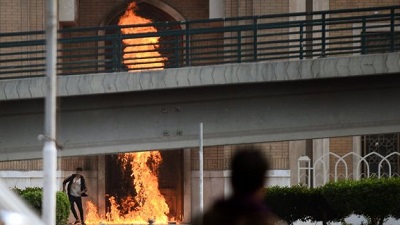
Iraqi Prime Minister (PM) Adel Abdul Mahdi has submitted his resignation, his office says, after more than 40 people were killed on the bloodiest day since anti-government protests began.
Mr Abdul Mahdi’s decision comes after Iraq’s top Shia Muslim cleric condemned the use of force against protesters and called for a new government.
Nearly 400 people have been killed in protests since the start of October.
Iraqis are demanding jobs, an end to corruption and better public services.
United Nations (UN) Secretary General Antonio Guterres said he was “deeply concerned over reports of the continued use of live ammunition against demonstrators”, and called for “maximum restraint”.
The statement said he would present his resignation to parliament so lawmakers could select a new government.
It came after Grand Ayatollah Ali al-Sistani called for a new government.
“In response to this call, and in order to facilitate it as quickly as possible, I will present to parliament a demand [to accept] my resignation from the leadership of the current government,” the statement signed by Mr Abdul Mahdi said.
On Sunday, parliament will hold an emergency session to discuss the crisis.
Earlier on Friday, Ayatollah Sistani said the government appeared to have been “unable to deal with the events of the past two months”.
“Parliament, from which the current government emerged, must reconsider its choices and do what’s in the interest of Iraq,” he said in remarks delivered by his representative during a televised sermon in the city of Karbala.
The ayatollah said attacks on peaceful protesters were “forbidden” and also urged demonstrators to avoid violence and “eject vandals” from their midst.
Mr Abdul Mahdi had earlier ordered an investigation into Thursday’s violence in Dhi Qar and Najaf provinces.
Mr Abdul Mahdi took office just over a year ago, promising reforms that have not materialised.
Young Iraqis angered by his failure to tackle high unemployment, endemic corruption and poor public services, took to the streets of Baghdad for the first time at the beginning of October.
After the first wave of protests – which began in October, lasted six days and saw 149 civilians killed – Mr Abdul Mahdi promised to reshuffle his cabinet and cut the salaries of high-ranking officials, and also announced schemes to reduce youth unemployment. -BBC



